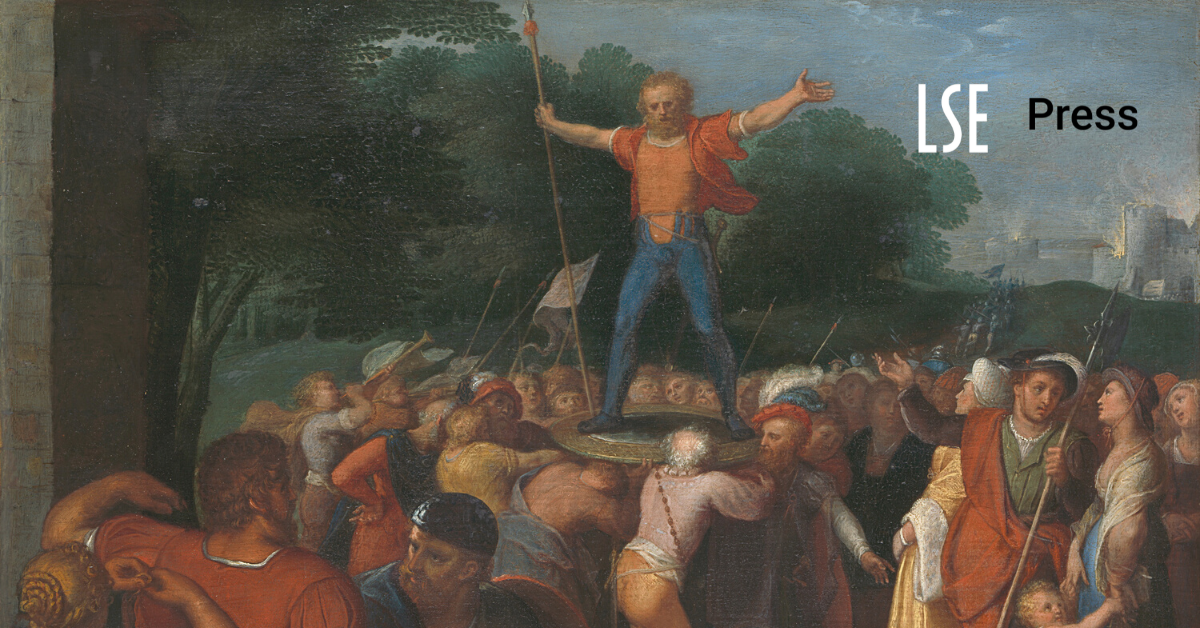One year on from its publication, Paul Kelly’s Conflict, War and Revolution: The problem of politics in international political thought has been downloaded over 3,000 times from the LSE Press website.
To mark the anniversary, we interviewed its author to consider key themes of this powerful work of political thinking, considering the changing landscapes of international politics 12 months on.

- LSE Press: Hello, Paul. Your book is centred around the political writings of a broad canon of theorists. Primarily, you tackle 10 key political thinkers – Thucydides, St Augustine, Machiavelli, Thomas Hobbes, John Locke, Jean-Jacques Rousseau, Clausewitz, Lenin and Mao, and Carl Schmitt. Of these, whose work has had the biggest influence on your writing, thought, and research? Were there any other notable figures which you would have liked to have included?
Paul Kelly: The list or canon of theorists was drawn from a longer list of thinkers I have been interested in for a long time – perhaps there will be a second book that covers them but it would have a different narrative story.
On the question of who would I have liked to add – the obvious candidate (to me) is Judith Shklar as she is interesting in her own right and is being reconsidered in light of some of the themes covered in the book.
Who has had the most impact? I tend to like those I disagree with most so in that respect Augustine, Clausewitz and Schmitt are high up. Thucydides is in a different category and I think all politics students should read his history.
- Much has happened since the publication of Conflict, War and Revolution: The problem of politics in international political thought in 2022. From the Russian invasion of Ukraine, to waves of strike action and ongoing climate protests across the globe. Drawing upon the political theorists cited in your book, alongside your own work, how does your book enrich our understanding of the political conflicts we presently face in a UK context?
The obvious challenge since the book is the interstate war in Eastern Europe. We had assumed in the west that wars happen elsewhere amongst ‘new actors’ in failed states but now we have a very old-fashioned war of opposing armies with familiar technology such as Tanks and Artillery etc. This made some of the ideas and theorists in the book extraordinarily prescient – as Clausewitz and war strategy is subject of op-eds, and as Schmitt is called on by some of the more ‘theoretical’ Putin apologists/ideologues.
But other issues are also important. The internal struggles within the UK’s ruling party with its opposition between national protectionism and ideology and global cooperation/trade versus sovereignty is well informed by some of the arguments. Indeed two of the most prominent defenders of Brexit sovereignty as a theoretical project are leading Hobbes scholars – Noel Malcolm and Richard Tuck.
Finally, Biden’s strategy towards China raises both the familiar Thucydides trap and the idea of Grossraum ‘blocks’ found in Schmitt theory of international politics. In this realignment, where should the UK be as Sunak tries to reorient foreign and trade policy post Brexit?

- What is the problem of politics today?
The problem of politics today – nicely illustrated by Sir John Major’s recent comments on the NI deal – is the limits of consensus in a world of entrenched interests. Is principled cooperation possible, or is everything zero-sum, winner takes all? A model of international politics is increasingly being applied to domestic party politics; cooperation or confrontation.
- What advice would you give to anyone considering putting together their first book proposal / writing their first work of political theory?
My advice would be to write a specialised text/monograph as opposed to a survey text. Survey texts or textbooks are very hard to do and are best done mid/late career when one’s authority is established, not least because you invite the criticism of all the experts. As I have seen over a relatively long career – 4 decades – is that political theory changes very significantly in terms of the salience of questions asked and answers sought.

- Why did you choose to publish Open Access and how would you describe your experience of publishing with LSE Press?
I was encouraged by the former LSE Librarian Nicola Scally who suggested I write her a book in my sabbatical after being a Pro-Director as she was setting up an online Press with Patrick Dunleavy as Editor in Chief. I was of an age and status in my career I could take a risk and see what writing on online open access book would involve. I was always a bit sceptical of open access online monographs but have now become an ardent enthusiast.
I’ve really enjoyed the online/open access part of the book as I can use it in a variety of ways in my teaching – either as select secondary material on my big first year course GV100 or as a course textbook on my University of London online course and a specialist third year option GV326.
Working with LSE Press has been fantastic. The review process was rigorous but also relatively speedy compared to my previous experience with University Presses and other publishers. I was very pleased with the production values and the quality of the editorial and production team. I am also delighted that the Press was able to source the wonderful cover art (Gino Severini Armoured Train in Motion) just brilliant!
*
Paul Kelly (@PJThinker) is Professor of Political Theory at the London School of Economics and Political Science and a former Pro-Director of the School. He is the author and editor of sixteen books and edited collections and published numerous scholarly articles. His interests range across political theory and philosophy and the history of thought. He has edited and co-edited the journals Utilitas and Political Studies and cofounded Political Studies Review.





